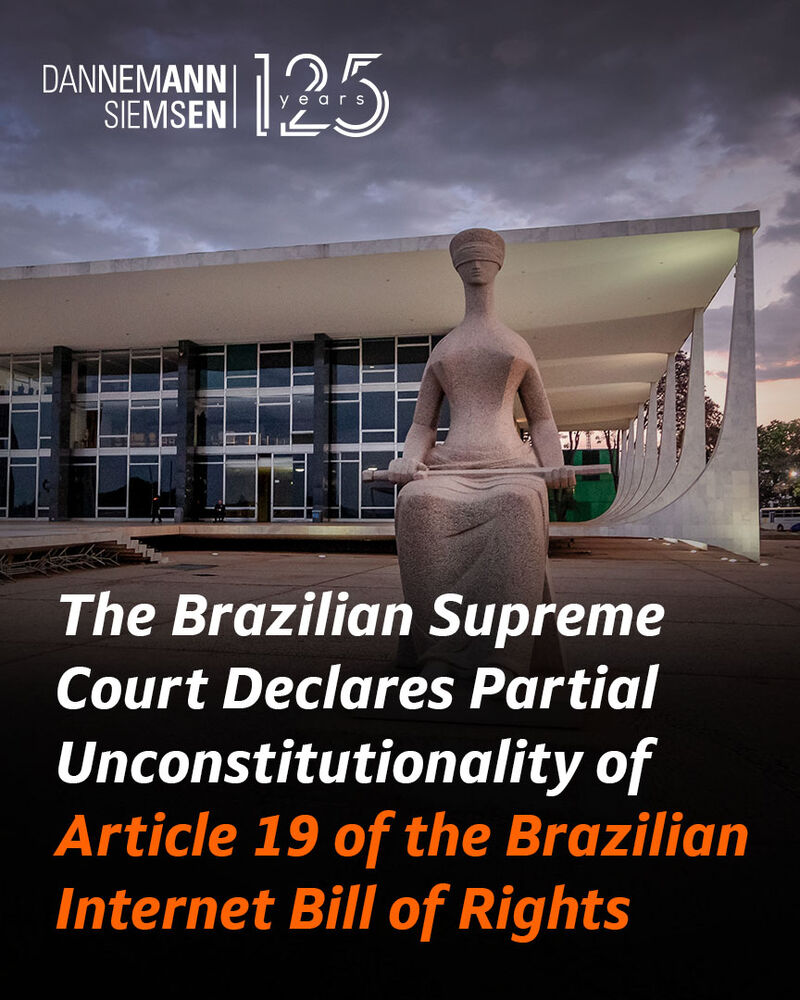27 de junho de 2025
Share
The Brazilian Supreme Court declares partial unconstitutionality of Article 19 of the Brazilian Internet Bill of Rights and expands the liability of digital platforms
On Thursday (26), the Federal Supreme Court (STF) concluded its judgment of two appeals with general repercussion concerning the civil liability of digital platforms for content published by third parties. By majority vote, the Court ruled that Article 19 of Law No. 12,965/2014, known as the Brazilian Internet Bill of Rights (BIBR), is partially unconstitutional. The provision, which requires a specific court order to hold internet application providers civilly liable for damages caused by third-party content, was deemed insufficient for failing to ensure adequate protection in cases involving serious violations of constitutionally protected legal interests, such as fundamental rights.
In the judgment, the STF analyzed two specific cases that gave rise to the controversy. In RE 1057258 (Theme 533), under the rapporteurship of Justice Luiz Fux, an internet application provider appealed a conviction for moral damages due to its failure to remove offensive content posted by students in a virtual community against a teacher. The Court upheld the appeal and overturned the provider’s liability. In RE 1037396 (Theme 987), under the rapporteurship of Justice Dias Toffoli, the case involved a platform’s inaction in the face of a fake profile on a social network that used a user’s image to make offensive statements. Despite being privately notified, the company refused to remove the content, arguing that removal was only required upon a judicial order. The lower court held the platform liable for not removing the content, and the company appealed. In this case, the STF denied the appeal and upheld the decision by majority vote.
Both cases addressed the civil liability of internet providers for failing to remove third-party content. Given the relevance of the matter, the STF recognized the general repercussion, meaning that the decision will have a binding effect on similar cases.
To resolve the controversy, the Court assessed the constitutionality of Articles 19 and 21 of the BIBR. Article 19, in its original wording, provides that internet application providers may only be held civilly liable if, after a specific court order, they fail to remove content considered to violate third-party rights. Article 21, in turn, establishes an exception to Article 19 and provides for subsidiary liability when, upon notification by a participant or their legal representative, the provider fails to promptly remove nonconsensual content involving nudity or private sexual acts.
By a wide majority (8 out of 11 votes), the STF held that Article 19 is partially unconstitutional—not for requiring a court order, but for its omission in failing to provide for exceptional cases beyond those addressed in Article 21. As a result, the Court declared the partial unconstitutionality of Article 19, with prospective effect (modulation), and issued new guidelines for the judiciary, pending eventual legislative regulation by Congress.
The thesis established by the STF outlines three main scenarios: (i) cases in which provider liability depends on failure to comply with a court order to remove content requested by the user; (ii) cases where extrajudicial notice alone is sufficient to trigger civil liability; and (iii) situations in which the platform has a prior duty of care to prevent the dissemination of manifestly illegal content.
In the absence of new legislation, Article 19 of the BIBR must be interpreted to allow civil liability of internet application providers, without prejudice to the specific rules of electoral law and regulations issued by the Superior Electoral Court (TSE).
Under Article 21 of the BIBR. internet application providers will be held civilly liable for damages caused by third-party content in cases involving crimes or unlawful acts, without prejudice to the duty of content removal. The same applies to accounts reported as inauthentic.
The Court also clarified the application of Article 19 to: (i) email service providers; (ii) application providers whose primary purpose is to host closed video or voice meetings; and (iii) instant messaging service providers, exclusively in regard to interpersonal communications. In defamation-related cases, Article 19 applies, without prejudice to the possibility of removal via extrajudicial notification.
Furthermore, when offensive content has already been declared illegal by judicial decision and is subsequently replicated across different platforms, all providers must remove it—upon either judicial or extrajudicial notice—without the need for a new court order.
Internet application providers operating as marketplaces are subject to civil liability under the Consumer Protection Code (Law No. 8,078/1990).
For the exceptional cases highlighted, providers are required to immediately take down content that constitutes serious criminal conduct. In such cases, platforms must act without delay to remove content involving, for instance, hate speech, racism, child pornography, attacks on the democratic rule of law, crimes against women, LGBTQIA+ individuals, children and adolescents, and human trafficking. No judicial order or prior notification is required: once the content is detected, immediate removal is mandatory, and failure to act constitutes an unlawful omission.
The Court also established a presumption of liability in cases involving paid promotion of illicit content or the use of artificial distribution networks such as bots or chatbots, unless the provider demonstrates that it acted diligently to promptly remove the content.
Additionally, the STF imposed new transparency obligations on providers, such as the creation of accessible complaint channels, the publication of annual reports, and the implementation of mechanisms to ensure due process. Users who have had content removed are guaranteed the right to request judicial restoration.
Regarding the nature of liability, the Constitutional Court clarified that strict (objective) liability does not apply under the thesis adopted.
At the end of the trial, Chief Justice Luís Roberto Barroso emphasized that the decision sought a middle ground between the previous model—which required a judicial order as a precondition for liability—and the European model, which imposes liability after failure to act upon private notice.
The full general repercussion decision can be accessed at the following link: https://noticias-stf-wp-prd.s3.sa-east-1.amazonaws.com/wp-content/uploads/wpallimport/uploads/2025/06/26205223/MCI_tesesconsensuadas.pdf
Note: For quick release, this English version is provided by automated translation without human review.
